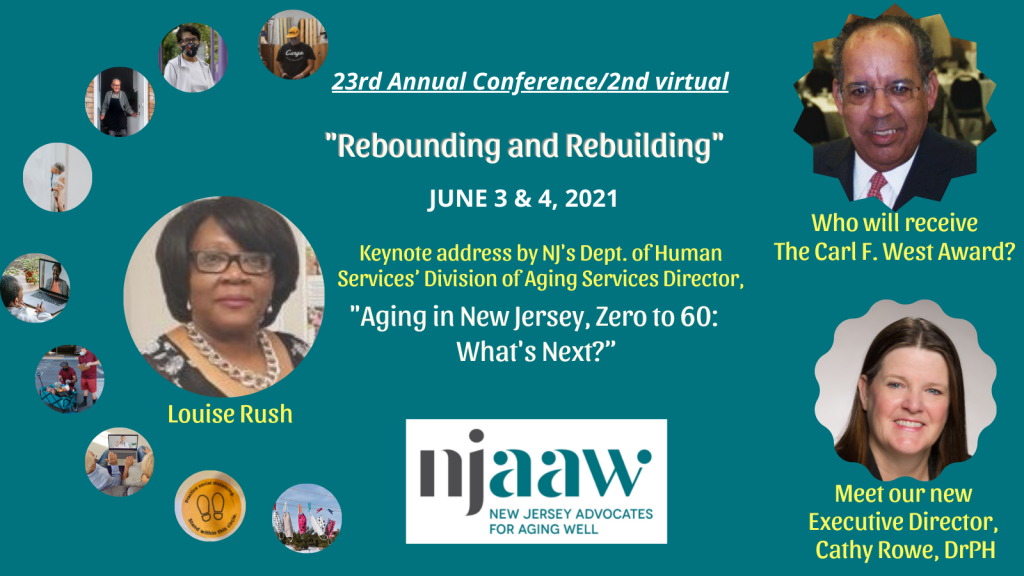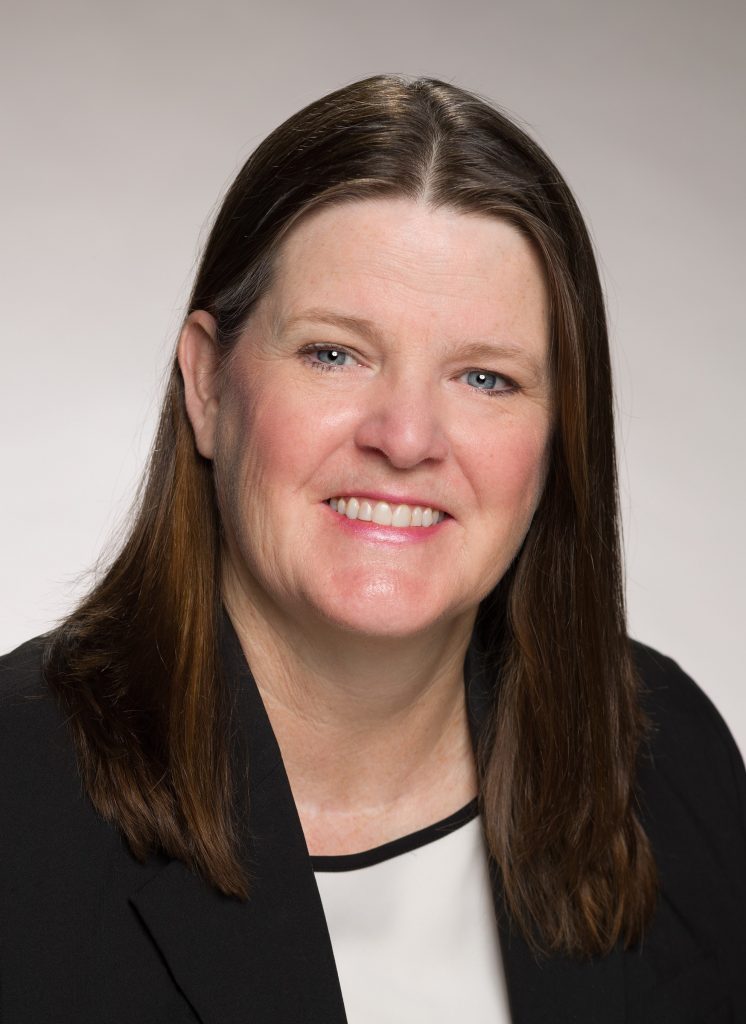
Excerpt from a speech by Cathy Rowe, DrPH, NJAAW’s new Executive Director
For the last four to five years, I have been deeply involved in age-friendly efforts and communities, and as you have heard in recent weeks — and from some of our [conference] speakers — NJ has committed to becoming an age-friendly state. So, this is an exciting time with a lot of opportunities for all of us in the field of aging to make change where needed, keep all the best of what we do and attempt things we never thought possible before. Now is the time to reach high.
When [NJ’s Director of the Division of Aging Services (DoAS)] Louise Rush told us that 23+% of NJ residents were over age 60, even I was surprised. That’s a lot! It really is a lot.
We have known that the Baby Boomers — the bubble born post-WW2 through 1968 — were the largest population group ever seen in the US, and we have watched for 60 years as they moved through the schools systems, the workforce, started their families and now enter retirement. We built schools for them, colleges, highways and other infrastructure to accommodate this population growth, but we are still not fully prepared for their next stage of life.
Living longer; prepping for the future
Part of this is because when they were born, the average life expectancy was still under 70 years. Now, a child born today may easily see their 100th birthday. That is a big change and a rapid change. Nobody building new schools to accommodate an influx of students in 1960 predicted that those same children would live as long and as well as they are now.
There is a lot to do to prepare. Coming out of COVID, as we rebuild and rebound, we need to keep the lessons we learned and use them for long-term planning, to shape policy and make improvements. No problem that any of us were working on before COVID was solved — most were accentuated. Many new, or rather, unrecognized challenges, were brought to the forefront. And we saw some very creative solutions.
Aging is actually one of the very few things we all have in common. My background is in public health, and I was once asked how public health fit into healthy aging. I responded that healthy aging is the goal of public health. All efforts, research, programs — whether long-term or in quick response to something like a pandemic — are with the goal to help people live long, healthy lives as individuals and as a population.
Not just aging — aging well
So, the question we face is: How do we age well — as individuals, as communities and as a state?
So, the question we face is: How do we age well — as individuals, as communities and as a state?
At NJAAW, our role and goals are aligned with our emerging from COVID, the review of the state plan for older adults, and the age-friendly efforts. For 10 years, NJAAW has provided Aging Insights, our award-winning TV program, covering topics that range from health, pandemics to personal finances and just about everything in between. We will continue Aging Insights as well as holding webinars that have provided interactive sessions with colleagues in the field who have found unique ways to approach aging issues in their communities.
Sharing, educating, advocating
And based on the response to our conference’s networking session, and the very active Q&A for presenters, we will offer more opportunities to bring you together for discussions and idea-sharing — one small benefit of the last year is that we can now connect so easily online. Meeting online breaks down the many silos that might block our natural interaction — either by service area or geography.
This is NJ and with over 500 municipalities doing things 500 different ways, it is difficult to see what another community is doing and find ways to implement it for your town or program or agency. We want to help in the sharing of ideas, lessons and successes you all have had in your work.
As NJ works towards becoming an age-friendly state, we will continue the education and advocacy we have done for the past 23 years. We will increase our focus on policy and joining the discussion on age-friendly efforts and the changing demographics of our state.
2030, that looming year we in NJ and many states expect to see the number of 60+ year old residents outnumber the number of students in the classrooms, is not far away.
We will highlight issues of importance with
- Data
- Academic research and
- The experience of local efforts bubbling up and state efforts going down
Where do we meet in the middle?
Your plans for aging well?
I asked Louise Rush and members of the breakout groups what their plans are for aging well — and I am going to keep asking so everybody, start thinking. We are all professionals here, working to help people age well. Whether social worker, housing, health care, recreation, mental health or transportation — we are working now to not only meet needs but to make life better for older New Jerseyans.
But as the flight crew always tells us, “Put on your own oxygen mask first.” Louise Rush said age 0 – 60 goes fast. Age 60 – 90 might slow down for some as you find new time in retirement or might speed up more with additional family, responsibilities, or new careers and activities.
So, do not just think of what needs to be done right now, coming out of COVID, or for the next year, or the next inspection or budget cycle. Think of what YOU can do long term and what WE can do together. What do you personally want for your aging plan? Where do you want to live? Are you financially prepared?
Whether you are new to the field, mid-career or counting the weeks until you retire, envision where and how you want to live and what you will need. Now go do it!
The time is now
The timing for coming out of COVID actually is good, if there could ever be a “good time” or anything good to come from a pandemic. What I mean by that is that we are re-emerging and rebuilding at the exact time other significant changes are about to be made. We are launching statewide efforts to make NJ an age-friendly state just as we are looking at the lessons we learned from COVID.
We saw the devastating fragility of some of our residents who succumbed to this disease. We saw that socioeconomic status, including race and income, had a significant impact on whether someone caught COVID and their ability to recover.
Lessons to be learned
More than ever before, we came further in the last year in recognizing racial inequities, which become more pronounced as we age. We saw some communities embrace technology while others were left further behind. We learned that we do not know enough about our older residents who live in their own homes, who are not in any programs or receiving benefits. What do all of these have in common? They are lessons we learned and data points we can use going forward.
At NJAAW we are going to keep doing what we do well — convening, educating and advocating for older residents. To be as effective as possible at this important time of change, we will examine data more carefully to identify needs and to help shape policy. Look for the data highlights we will include in our newsletter and other communications.
Data = direction
From my time in academia, I learned that it is only with good data that we can help shape good policy and then implement that policy as effectively and efficiently as possible. I am thrilled to have supportive and dedicated people in our statehouse, including Assemblywoman Valerie Vainieri Huttle and the members of the Aging and Senior Services Committee in the Assembly, and Director Rush shaping our next steps in policy and programs. At NJAAW we will share the data and discussions with you and will advocate for policy and the funding necessary to make NJ a state where we can all age well.
About Dr. Rowe

Executive Director
NJ Advocates for Aging Well,
Photo by Steve Hockstein HarvardStudio.com
Cathy Rowe, DrPH, was named Executive Director of NJ Advocates for Aging Well in May, 2021. Most recently, Dr. Rowe served as Coordinator for SOMA (South Orange/Maplewood): Two Towns for All Ages, a grant-funded healthy aging initiative in a community with more than 6,000 residents over 60. This cutting-edge collaboration, based on the World Health Organization’s Domains of Healthy Aging, focuses on developing programs to address economic and infrastructure needs for an age-friendly community.
Dr. Rowe has spoken extensively on aging issues at conferences and symposia locally and globally and is an expert in establishing age-friendly communities. In 2020, the National Association of Area Agencies on Aging presented her with a “Best Practices for Socially Engaging Older Adults Award” for the “Repair Café” she established — the first of its kind in NJ. An inter-generational event, the cafe brings together people of all ages and levels of expertise to repair and save treasured items. This also helps to keep such items out of landfills.
Dr. Rowe serves on the steering committee for Impact 100 Essex and is a mentor for the Juvenile Diabetes Research Foundation. Previously, she was a Board member for the Interfaith Hospital Network.
Dr. Rowe earned her DrPH in Health Policy and Management from Columbia University, where she received a Fellowship in Public Policy. Her BA in Economics is from Bates College.

